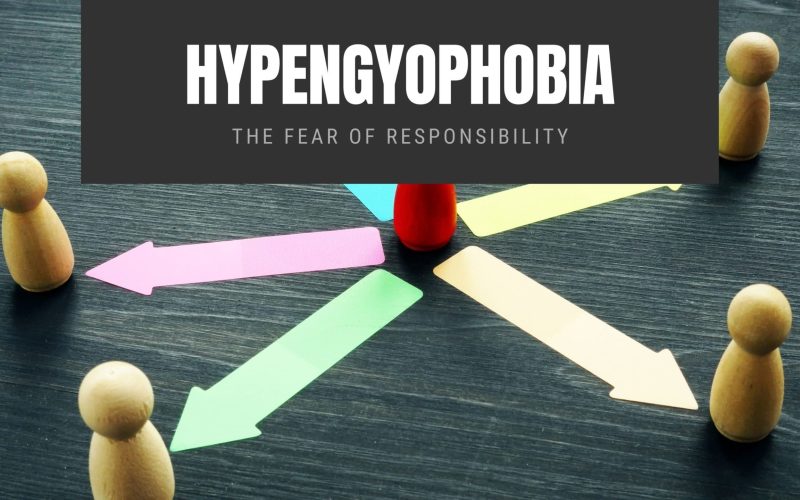Have you ever been faced with certain responsibilities, and the fear of being the person in charge hits you? Well, if you have, then you may have suffered from a brief moment of hypengyophobia.
Hypengyophobia, which is otherwise known as hypegiaphobia, can be defined as the irrational and overwhelming fear of responsibilities.
Every day, humans are faced with choices; some are difficult, some are easy. However, most of these choices, especially those that are tough, involve others; hence, we have to think twice before making them.
For most people, there are no hassles about making these choices; however, for those who suffer from hypengyophobia, having to make these decisions can be a real nightmare.
People who have hypengyophobia have the initial instinct to run away once the word ‘responsibility’ is mentioned.
This means these people have uncontrollable feelings of avoiding being in charge of another person. They usually don’t want to be part of a person’s negative or positive results.
Hypengyophobia is derived from two Greek words: “hypengyos,” which means “responsibility,” and, of course, “phobia,” which means “fear.”
Research has shown that most people with this condition are often unaware. For some people, their fear of responsibilities is only fear.
In contrast, for others, it can quickly graduate from being a fear into an anxiety attack and then into a panic attack.
Anyone who is experiencing a panic attack will experience symptoms such as an increased heart rate, increased breathing rates, an increase in the patient’s blood pressure, muscle tension, increased sweating, trembling, tremors, and so on.
It is important to note that it is not everyone who has an anxiety attack that will go on to develop an anxiety attack.
People who are suffering from hypengyophobia may, later on, find out that they are always avoiding their fear.
Sometimes, they may find that, in avoiding their fears, they are taking it to the extreme by refusing to take up any responsibility of any kind.
Just like other phobias, people who have hypengyophobia will actively avoid their fear in a bit to reduce the risks of developing any form of anxiety.
This avoidance will do nothing to improve their condition; instead, it will only worsen any symptoms that they will feel when, eventually, they are faced with their fears.
Causes of Hypengyophobia
The exact cause of this anxiety disorder is not known. However, scientists have attributed certain factors that usually contribute to the development of these phobias.
These factors include:
Genetics
Experts believe that for you to develop any phobia, you must have had the genetic disposition to develop anxiety and mental disorders.
In other words, for you to develop hypengyophobia, it means that a certain member of your family may have developed a particular phobia, another type of anxiety disorder, or even a mental disorder.
It is, however, important to note that although you have the genetic predisposition to develop anxiety disorders, you may not necessarily develop the kind of anxiety disorder your family member had previously developed.
This means that, for example, although your father or mother had developed nudophobia(fear of nudity), and you have the gene for developing anxiety disorders, you may not necessarily develop nudophobia.
You might instead go ahead to develop a different kind of phobia, such as hypengyophobia.
Environmental Factors
Although you have the gene for developing anxiety disorders, for that gene to manifest, an environmental factor is needed to trigger the reaction of that gene.
In other words, before you can start having any anxiety disorders (in this case, hypengyophobia), an external factor such as a traumatic event.
Research has shown that many people who developed hypengyophobia have had a past traumatic event that has led them to conclude that having to be responsible for another person is scary and dreadful.
For most people who have developed this disorder, there had been a traumatic disorder that has been a result of them taking on a responsibility.
Still, for some reason, they failed, and as such, an unfavorable consequence occurred, resulting in the development of this disorder.
Aside from the trigger of a past traumatic event, other environmental factors that can result in the development of this disorder include teenage youth rebellion as well as a very strict upbringing.
However, regardless of what might have caused their hypengyophobia, the individual who has this condition can experience anxiety attacks as well as emotional disarray that can end up destroying their ability to function as a person who is responsible.
Symptoms of Hypengyophobia
Responsibilities are part of life; however, for some, responsibilities are scary.
Just like people who have other phobias, people who have hypengyophobia tend to avoid their fears, and once they come in contact with their fear, they tend to have symptoms of anxiety and panic attacks.
These symptoms are often regarded as their physical symptoms. Some of these physical symptoms include;
- Sweating
- Trembling
- Hot flushes
- Cold chills
- Shortness of breath that can sometimes result in difficulty breathing
- Tachycardia which is characterized by the rapid beating of the heart.
- Racing heartbeats and pulse rates
- Pains or tightness felt in your chest
- Dizziness and lightheadedness
- Tingling sensations felt in both the hands and feet
- Tremors and uncontrollable shaking of hands
- Muscle tightness and tension
- Restlessness
- Lack of coordination
- Headaches
- Intense difficulties to calm down
- Vomiting and nausea
It is important to note that some of these symptoms can sometimes appear without any previous warnings or signals.
Also, most people suffering from hypengyophobia may not necessarily need to be close to their triggers before they start experiencing anxiety and panic attacks.
For some, all they need is to think of any responsibility, and from there, they can begin to develop hypengyophobia.
Psychological Symptoms
In some sporadic cases, some people who suffer from hypengyophobia when exposed to responsibilities can start manifesting psychological symptoms even before they develop physical symptoms.
Some of these psychological changes include:
- Intense fear of always losing control
- Fear of feeling faint
- Feelings of dread and anger
- Fear of dying
- Fear of losing someone in your care to death
- Fear of harm or sickness coming upon you, the person to be kept in your custody, or even both of you
- Self-blame, guilt, and shame
- Low self-esteem issues.
- Withdrawal from others
- Unexplainable feelings of hopelessness and sadness.
- I always feel disconnected and depressed.
- Feeling irritable and changing moods (popularly known as mood swings)
- Fear and anxiety
Treatment
Many individuals who are suffering from hypengyophobia usually feel that they don’t need treatments, and this is because they think they can always end up avoiding their fears.
Also, they believe that they are in control of their problems, which gives them a false sense of control.
However, they will eventually discover that they can’t always run from their fears, and as such, they need the help of an expert to understand their condition.
Although most phobias are curable, no specific treatment plan is guaranteed to work for all phobias.
It is important to note that most treatment plans combine treatments; however, you must not undergo any therapy without consulting your doctor.
The treatments mentioned below are strictly for educational and information purposes and not for self-treatment.
Talking Treatments (Therapy)
Most talking treatments, also known as therapies, are mostly counseling sessions. Therapies have been seen to be very useful, although they are laid-back treatments and not physically intrusive.
This means that you are not going through any treatments that involve using needles and the like.
Therapy involves speaking to a professional about your feelings, thoughts, and attitude. Your therapist, in turn, helps you understand why you think and behave the way you do. Most talking treatments include:
Cognitive Behavioral Therapy
Cognitive Behavioural Therapy(CBT) treatments are based on the speculation that our behaviors are constantly influenced by the things we perceive and think.
When we experience anxiety and distress, it causes a distortion in our thought processes as well as our perceptions. As such, during this period, our reality is not often what is really happening.
CBT treatments aim to correct this distortion. Cognitive Behavioural Therapy seeks to identify reality and employ strategies to help the patient notice it.
For example, when a patient is experiencing hypengyophobia, through the aid of CBT, your therapist helps you to identify your fears and check if they are an accurate depiction of what reality should be and, if not, seek ways to change your thought processes.
Exposure Therapy
Exposure therapy is one of the most common treatments that are employed to treat specific phobias and other anxiety disorders.
As the name implies, exposure therapies work when your therapist gradually exposes you to your fears over a particular period but in a controlled environment.
For patients who have a phobia when it comes to dealing with responsibilities- a person who has hypengyophobia, your therapist will most likely gradually expose you to your fears by initially explaining what it means to be responsible, how to be responsible for others, and so on.
This process often helps to desensitize the patient to his or her fears and to let the patient know that his or her fears are nothing more than a figment of the patient’s imagination.
Exposure therapy works with the belief that the more people are exposed to their fears, the more they adapt, and soon, they will find out that their fears are all gone.
Use of Medications
Most times, depending on how severe your fear is, your doctor may prescribe the use of certain medications that can help reduce your fears.
Some of these medications include antidepressants such as Lexapro, Paxil, Zoloft, and so on, anti-anxiety drugs such as Xanax, Klonopin, Valium, and so on, as well as benzodiazepines.
These drugs generally help you relieve your symptoms and help you get better.





